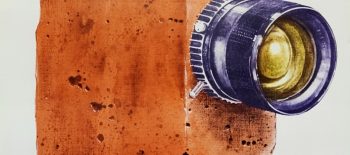In Between: translating DEBORA VOGEL & SZCZEPAN TWARDOCH
Polish Cultural Institute NY is honored to partner with the American Literary Translators Association during 43rd annual conference, #ALTA43: In Between, from September 30 – October 18. For the first time, the largest gathering in the US for literary translators has gone virtual, welcoming attendees from all over the globe. Check out ALTA website to see the schedule of virtual events, with events about different aspects of literary translation taking place each day, culminating in a weekend of all-day conference events on October 17 and 18.
Since 1978, the American Literary Translators Association has annually celebrated the literary translators of the best English translation of literature published in the previous years. Taken together, the conference makes a useful roadmap for the current literary landscape of translation. This year, Polish and American experts in the literary field will share their insights on Polish and Jewish literature in translation. The presenters will provide a brief overview of the history background, the uniqueness of the 20th century and the contemporary literature coming out of Poland, focusing on the process of translating Debora Vogel (Anastasiya Lyubas) and Szczepan Twardoch (Sean Gasper Bye) published in the United States.
We cordially invite you to take part in two special events during the 43rd ALTA conference:
on October 13 at 3:00PM EST, “Blooming Spaces: Translating Debora Vogel, the Gertrude Stein of Interwar Poland” moderated by Anthony Polonsky (Brandeis University) and Natalya Lazar (US Holocaust Memorial Museum) with presenters: Anastasiya Lyubas (University of Toronto) and Ariko Kato (Nagoya University, Japan)
Blooming Spaces: Translating Debora Vogel, the Gertrude Stein of Interwar Poland
Tuesday, October 13, 2020 3:00-4:00 PM EST
Debora Vogel (1900-1942) was the wandering star in literature who wrote in Polish, Yiddish, Hebrew and German. The discussion will involve the work of a strikingly original, yet overlooked author, art critic, and intellectual, and resituate Vogel as an important figure in the constellation of European modernity. Vogel’s astute observations on art, literature, and psychology in her essays, her bold prose experiments inspired by photography and film, and Cubist poetry that both challenges and captivates, invite the reader on a journey of discovery – into the microcosm of the talented thinker marked by tragic fate and the macrocosm of Polish and Jewish history in the twentieth century.
Readings will include Debora Vogel’s Polish and Yiddish texts, Japanese translations by Ariko Kato, as well as English translations by Anastasiya Lyubas from the forthcoming collection Blooming Spaces: The Collected Poetry, Prose, Critical Writing, and Letters of Debora Vogel.
Anthony Polonsky is emeritus Professor of Holocaust Studies at Brandeis University. From 2013 he has been Chief Historian of the POLIN Museum of the History of Polish Jews, Warsaw. His most recent work is The Jews in Poland and Russia volume 1, 1350 to 1881; volume 2 1881 to 1914; volume 3, 1914 to 2008 (Oxford, 2010, 2012), published in 2013 in an abridged version The Jews in Poland and Russia. A Short History (2014). He holds honorary doctorates from the University of Warsaw (2010) and the Jagiellonian University (2014).
Natalya Lazar is a Program Manager of Initiative for Ukrainian-Jewish Shared History and the Holocaust in Ukraine at the Jack, Joseph and Morton Mandel Center for Advanced Holocaust Studies, United States Holocaust Memorial Museum (USHMM, Washington, DC). She is responsible for building scholarly programs that focus on the Holocaust as it occurred in Ukraine. Natalya Lazar holds a doctorate in political science from Yuriy Fedkovych Chernivtsi National University in Ukraine. In addition, she is also receiving a second PhD from the Strassler Center for Holocaust and Genocide Studies at Clark University in Worcester, Massachusetts. Her dissertation is entitled “Czernowitz Jews and the Holocaust: Interethnic Relations, Violence, and Survival in a Borderland City, 1940-1946”. She has been a recipient of several academic fellowships, including Saul Kagan Claims Fellowship for the Advanced Shoah Studies, the Black Sea Link Fellowship at the New Europe College (Bucharest, Romania), and VWS Fellowship in the Holocaust and Genocide Studies at the NIOD and Amsterdam University among others.
Anastasiya Lyubas is a Visiting Research Fellow at the Northrop Frye Centre at the University of Toronto. She is the author of Blooming Spaces: The Collected Poetry, Prose, Critical Writing, and Letters of Debora Vogel (Boston: Academic Studies Press, October 2020). This edited collection features translations of Debora Vogel’s work from Yiddish, Polish and German into English. Anastasiya is also the author of White Words: Essays, Letters, and Reviews by Debora Vogel, a volume in Ukrainian (Kyiv: Dukh i Litera, 2019). Anastasiya holds a PhD from Binghamton University (2018). She was a Translation Fellow at the Yiddish Book Center (2017-2018).
Ariko Kato is Associate Professor at Nagoya University of Foreign Studies in Japan. She is a 2019-2020 Robert A. Savitt Fellow at the Jack, Joseph and Morton Mandel Center for Advanced Holocaust Studies at the US Holocaust Memorial Museum. She is the author of an award-winning translation of Debora Vogel’s Acacias Bloom into Japanese (Kyoto: Shoraisha, 2018). Ariko also translated Zofia Nałkowska’s Medallions. Her other publications include Bruno Schulz, From Eyes to Hands (2012 in Japanese, Polish translation in preparation). She is also an editor of Memory of World War II in Poland and Japan: The Holocaust and Hiroshima in Comparative Perspectives (published in Polish and Japanese, 2020).
on October 18 at 2:15PM EST, “Lots of Lingo: Strategies for Translating aHeteroglossic Novel” moderated by Madeleine Cohen (Yiddish Book Center) with presenters: Sean Gasper Bye and Sebastian Schulman
Lots of Lingo: Strategies for Translating a Heteroglossic Novel
Sunday, October 18, 2020 2:15-3:00 PM EST
How do we translate heteroglossic texts effectively, responsibly, and engagingly? The richly detailed world of Szczepan Twardoch’s 2016 novel Król, published in Sean Gasper Bye’s English translation as The King of Warsaw (Amazon Crossing, 2020) comes to life through gangster talk, boxing lingo, Yiddish dialects, and bad Polish. This session brings Bye together in conversation with Sebastian Schulman, who consulted on the frequent use of Yiddish, as well as Jewish terminology and cultural references, to discuss the strategies employed in this translation. The conversation takes this novel as a starting point for discussing practices relevant to translators working with texts from and about heterogenous places, as well as texts that foreground historical and cultural specificity.
Madeleine Cohen is the Academic Director of the Yiddish Book Center (Amherst, Massachusetts). Her work includes directing a fellowship program for emerging Yiddish literary translators and publishing and promoting Yiddish literature in translation. She received her PhD in Comparative Literature from the University of California, Berkeley.
Sean Gasper Bye translates Polish fiction, reportage, and drama. He is a winner of the Asymptote Close Approximations Prize and a recipient of an NEA translation fellowship. His translations of The King of Warsaw by Szczepan Twardoch and Ellis Island: A People’s History by Małgorzata Szejnert were published in 2020.
Sebastian Schulman is a literary translator from Yiddish, Esperanto, and other languages, and the Executive Director of KlezKanada, a leading organization in Yiddish music and culture. His translation of Spomenka Stimec’s Esperanto-language novel Croatian War Nocturnal was published by Phoneme Media in 2017. He lives in Montréal, Québec.
Supported by the American Literary Translators Association and the Polish Cultural Institute NY.



